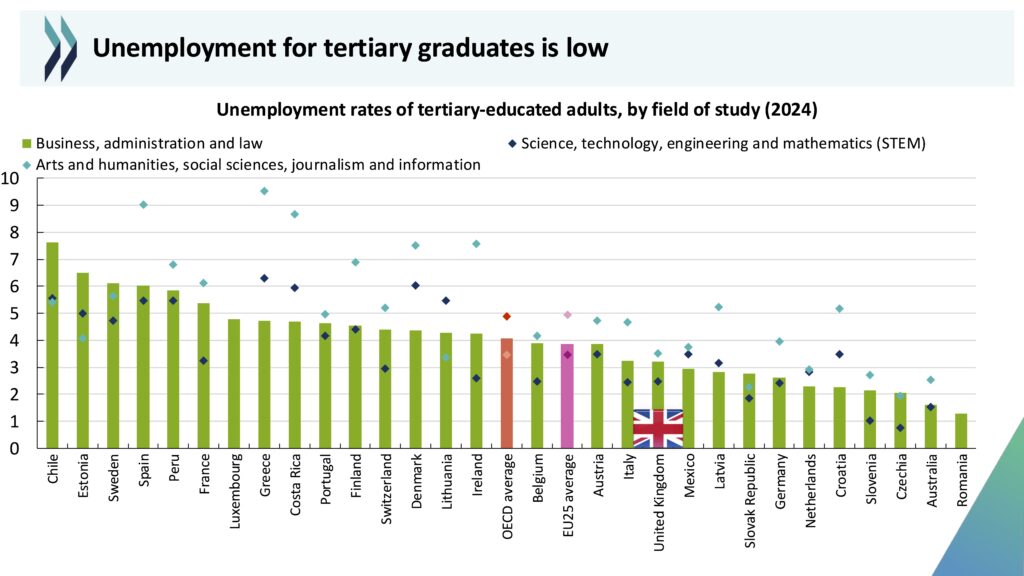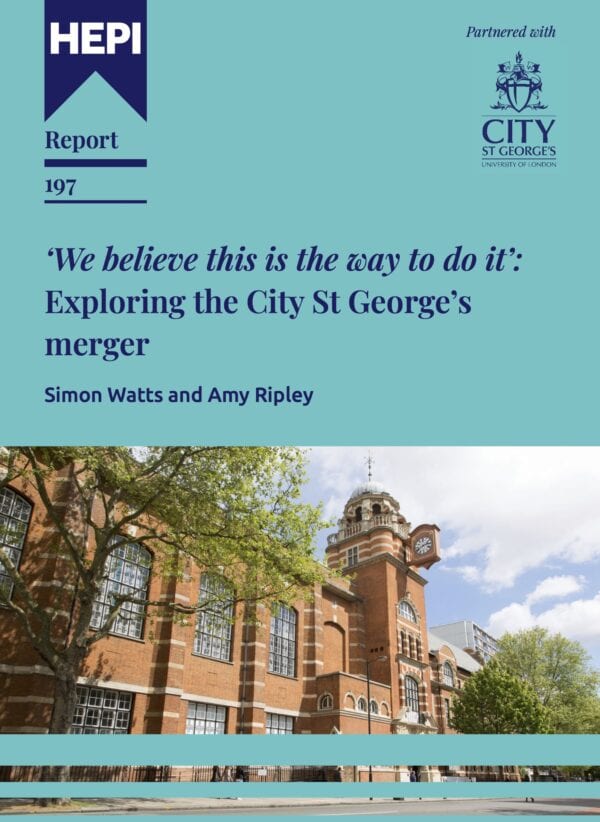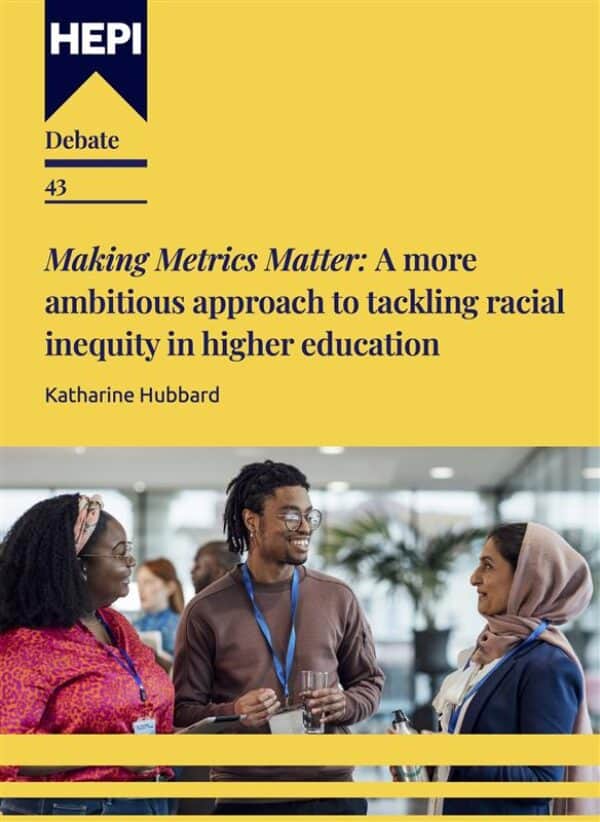Five myths: Higher education at this weekend’s Battle of Ideas
- HEPI Director, Nick Hillman OBE, spent some of his weekend listening to, and participating in, discussions about higher education at the Battle of Ideas at Church House in Westminster.
- Here are his remarks from a debate on whether we are now in ‘The Era of the Downwardly Mobile Graduate’.
Thanks for inviting me to speak. I agreed to do so for two reasons. First, the Battle of Ideas is a wonderful grassroots event. Secondly, Claire Fox invited me to speak immediately after the murder of Charlie Kirk. My daughter is keen on telling me where Charlie Kirk was misguided but, whether she is right or wrong, universities should be places where free and fervent debate thrives; not places where discussion gets closed down with a bullet. That should not need saying but, sadly, of course it does.
Last night, I went to a gig in Oxford by the fabulous band EMF – I first saw them as a fresher 35 years ago and, yes, they are still going. As you doubtless know, their most famous song is ‘Unbelievable’. And most of what we have heard, and are going to hear, is exactly that: unbelievable. Not in the ‘incroyable’ sense of the word, but in the sense that the claims are simply not true.
Let me explain in my few minutes why pretty much every point in the advertising blurb for this event is a myth.
Myth 1
We are told there are millions upon millions of people in ‘non-graduate roles’. But this relies on weird and poorly understood definitions of what graduate jobs are. Official definitions obviously rely on jobs being categorised into graduate and non-graduate.
My favourite critique of what this means comes from an – admittedly – old article by Peter Brant (on Wonkhe), which looked at the official classification from a few years ago, writing:
A civil servant who was promoted from an Executive Officer to a Higher Executive Officer would be moving from a graduate job to a non-graduate job. Managing an off-licence is a graduate job, managing a pub or a wine bar is a non-graduate job. A singer is a graduate role, a dancer is a non-graduate role. A clown is a graduate job, the manager of a circus is a non-graduate job. And – my personal favourite – a rag-and-bone man is a graduate job, an antiques dealer is a non-graduate job. The list goes on and on.
Myth 2
Myth number 2 is the idea that graduates ‘face grim prospects’. The OECD’s new Education at a Glance, which is an annual compendium of global education facts, shows this to be untrue.
Unemployment is much lower among UK graduates than among non-graduates – irrespective of subject area studied. Indeed, unemployment is much lower among UK graduates than graduates in other developed countries too.

There isn’t time to go into the huge other benefits of higher education but they include better physical and better mental health.
The OECD also show the UK does have a problem of low incomes. But this is not among graduates, where our outcomes are positive and comparable with those in other countries. We are literally at the bottom of the OECD league when it comes to earnings for people who have left school with low or no qualifications. They are the people being most let down.
Myth 3
The third myth in the blurb for today is that AI will remove the need for employers to recruit people with higher level skills. This is just a revamped version of John Maynard Keynes’s nonsense prediction that people at the end of this current decade would in future work for just 15-hours a week.
We published a collection of essays on AI last week. Perhaps the most thought-provoking one was by Professor Rose Luckin of the UCL Knowledge Lab. She argues persuasively that:
The AI revolution represents a pivotal moment where humans need to become more intelligent, not less, as we develop increasingly sophisticated tools.
Do come to our webinar on the back of the report early next month.
Myth 4
The fourth myth is that there are multiple really good alternative options to higher education. Ministers of different stripes have been telling us for years that there is about to be a huge expansion of apprenticeships for young people. Meanwhile, your children and mine are being pumped full of information about why they should do an apprenticeship rather than traditional higher education.
Yet the number of degree apprenticeships for school leaver is tiny, the number of apprenticeships has fallen since the Apprenticeship Levy was introduced and all those people who worry about university drop-outs should take a look at the high non-continuation rate for apprenticeships.
Apprenticeships don’t just happen because Keir Starmer or Kemi Badenoch say they should. Apprenticeships are jobs with training attached and the state of the labour market and the regulation of apprenticeships, not to mention the structure of the British economy, are not conducive to big increases in supply.
Myth 5
The final myth is the idea that there are tonnes of ‘disaffected university leavers’. Of course, higher education does not work out for all those who go all of the time. Indeed, we have shown in work with the University of Bristol that a high proportion of graduates would make a different choice, such as a different course and / or institution, if they were going back in time.
However, whether they chose exactly the right course or not, in our new work with King’s College Policy Institute, we show shows that a mere 8% of graduates regret their decision to enter higher education. Meanwhile other work shows younger graduates might have even lower regret rates than that.







Comments
Iwan Griffiths says:
Having 50% of people going to university should mean that 50% of all jobs should be graduate level jobs. Can that ever be the case?
Reply
Replies
Paul Wiltshire says:
Absolutely not. It is a complete nonsense. Of course we don’t need 50% of young adults to do another 3 years of academic study before entering the workplace (and get themselves into a lifelong debt). But I don’t think that Nick will ever change his tune as he seems to think that everybody should be a graduate.
Reply
T says:
Weak arguments – I would like to discuss this further
Reply
Jonathan Alltimes says:
If you agree with the OECD statistics, Britain has a high level of qualification mismatch (the highest), skills mismatch, and field of study mismatch. Our system of education has a low level of allocative efficiency and does not reflect what is required for high wage jobs or is not keeping pace with emerging skills, and does not support skills transitions.
https://www.oecd.org/en/publications/survey-of-adults-skills-2023-country-notes_ab4f6b8c-en/united-kingdom_02bc78e4-en.html
https://www.oecd.org/en/publications/2024/12/do-adults-have-the-skills-they-need-to-thrive-in-a-changing-world_4396f1f1.html
https://www.oecd.org/content/dam/oecd/en/publications/reports/2024/12/adult-skills-and-productivity-new-evidence-from-piaac-2023_805a88b8/8bc2c556-en.pdf
Reply
Paul Wiltshire says:
I think that when it comes to getting our young adults to be good as doing a job, we are focussing far too much on formal higher education as the answer, and have completely forgotten that simply starting as a trainee and learning on the job can more often than not be highly effective. We need to reign in the ‘commodification’ of education as if the only & best way to learn how to perform well in a career is to first buy a formal education from the HE sector.
Reply
Joe McGinn says:
I wasn’t at the event so can only infer based on the description, but the title of the session just seems… wrong? There was nothing in the description referencing downward mobility at all except the linked guardian article at the bottom.
The description, and naturally Nick’s responses, are all about the value of going to university in general terms, and relative to those who don’t. That’s a useful discussion to have, but it’s nothing to do with downward mobility.
There genuinely is a significant minority of graduates who are downwardly mobile, in that they end up in occupations that are in a lower ‘group’ than their parents. That hasn’t really happened before and I think is worth trying to keep distinct from a general discussion on the benefits of a young person going to university vs their peers who don’t
Reply
Add comment